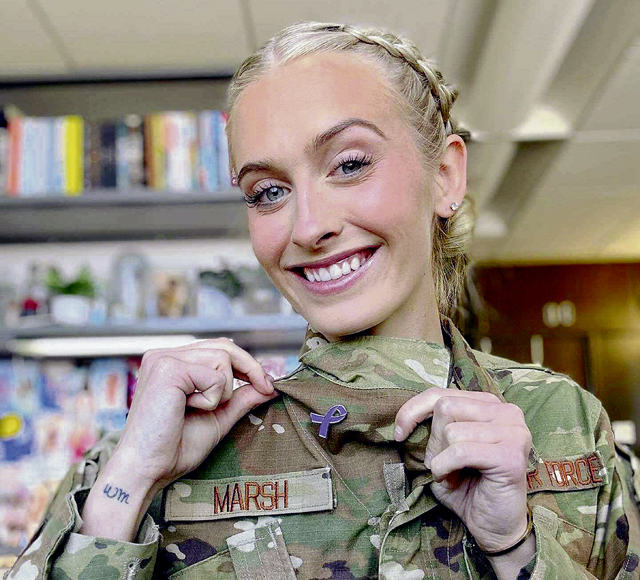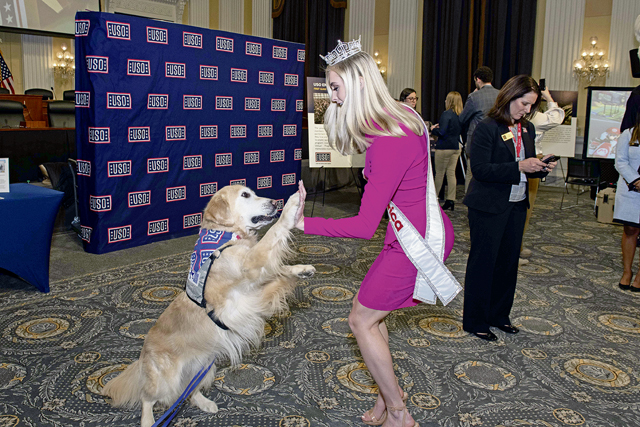
Air Force 2nd Lt. Madison Marsh made big plans for herself when she was young, although she never really factored becoming Miss America into that equation. However, after a tough competition in January, Marsh became the first active-duty service member to earn the crown. The 22-year-old U.S. Air Force Academy graduate is now learning to navigate life as a military member, a cancer research scholar and a public figure.
An early eye on the sky
Growing up, Marsh wanted to be a pilot and an astronaut, so she attended NASA’s Space Camp at age 13. When she learned that she could further her ambitions by going to the Air Force Academy, she started working toward becoming a cadet, even earning her civilian pilot’s license at 17 years old.
In 2018, Marsh lost her mother, Whitney, to pancreatic cancer. In her honor, the family started the Whitney Marsh Foundation, which raises funds for research and awareness to increase patients’ chances of early detection. Marsh took on the role of co-founder and president.
The following year, Marsh made it to the Air Force Academy, but she initially had bouts of homesickness.
“I was struggling — being removed from my family, grieving my mom, and now I’m in a really tough military environment,” she said, thinking back on her freshman year. That’s when she was inspired by her cousin, who was a pageant contestant, to give pageantry a try. “I decided to take a stab at pageants to see all the different ways that it could help me.”
Highlighting similar values
There are a lot of stereotypes regarding beauty pageants and the people involved in them, but Marsh said there are actually a lot of overlapping core values that pageants and the military share.
“I realized pageants have always been about community service, leadership, resume building and public speaking, and I think that is what made me be able to be successful in the Air Force,” she said.
After a lot of studying and several internships, including with NASA, Marsh graduated from the Air Force Academy in the spring of 2023 with a degree in physics. Upon her commissioning, she received a pilot’s billet. But soon after, she was crowned Miss Colorado, and her career trajectory started to change.
In September, Marsh decided to defer her pilot training to pursue a master’s degree in public policy from the Harvard Kennedy School — an option made possible through the Air Force Institute of Technology’s Civilian Institution Programs. She’s also a graduate intern at Harvard Medical School and is working with experts from the Dana Farber Cancer Institute on early cancer detection research — continuing her work for the foundation dedicated to her mom.

In January, Marsh won the title of Miss America during the national pageant in Orlando, Florida. Between her Air Force commitment, her studies and now these public-facing duties, she’s got a lot to juggle. Thankfully, the Air Force has rolled with her change of fortune and put her into a public affairs/recruiting position for the year that she is Miss America.
“The Air Force has been really, really wonderful with me,” Marsh said during a USO event she attended on Capitol Hill in February. “Basically, anytime I go and do Miss America events, I’m also giving back to the Air Force to ensure people know about the message of what it means to serve as 2nd Lt. Marsh — the different ways that they can get involved in the military, whether it be in the Air Force or other branches or different jobs.”
Honoring her mother
As far as her Harvard research goes, Marsh said she’s still working with her advisor and is excited about the possibility of bringing potential legislation related to their research to Capitol Hill over the next year.
“Now I understand the science side and [how to ask] medical professionals, ‘What do you think needs to be done for patients, and how can we get that done through legislation?’ Because through Harvard, even though I only got to do one semester there, I have learned that it is really easy to make bad policy,” Marsh said. “I think the best way to making good policy is by intimately understanding from the source — with patients — and intimately understanding that scientifically so we’re enacting it properly. Now that I have all of those communities able to give me that knowledge, I’m really excited to get to use that piece to come forward here on the Hill and maybe get some things done.”
She said it’s also a blessing for her to be able to share her mother’s story on such a large stage.
“Losing her when she was 41 to pancreatic cancer — I want people to know her story. I want them to know the signs, the ways to get help … because I don’t think we do enough for pancreatic cancer,” Marsh said. “My mom was misdiagnosed when we had no cancer history in our family. She was healthy. She didn’t have any of those warning signs, and she still passed away. We need to do more for our patients, and being able to have a national platform and a voice now to work with people is so important. I can’t think of a better way to [showcase] the legacy of my mom.”
Dispelling misconceptions about pageantry and service
As the first active-duty service member to earn the Miss America crown, Marsh’s national platform may help dispel the lingering assumption that military roles are too masculine for the average woman. Marsh said young women can make any position their own.
“I hope that women are able to see that they can define their own role in the military — whether they want to take it in the more feminine path or not — knowing that they are empowered to make that decision,” Marsh said. “I hope young girls can see that you can lead in the military, or you can lead in a board room, in the courthouse, in medical boardrooms — whatever it might be — and you can be taken seriously. Whether I’m in a crown and sash or whether I’m in my uniform, I serve as 2nd Lt. Marsh and I serve as Miss America simultaneously, and they do not take away from one another.”
When it comes to Miss America, there are several phases of competition: The public and private interviews, the talent portion, the evening gown and fitness competitions, as well as the social impact pitch. Between military fitness requirements and her work with the Whitney Marsh Foundation, the latter two weren’t a problem for Marsh. For her, she said the hardest part was talent.
“I’m not conventionally talented. I can’t fight, sing, dance or play an instrument — everyone would run off with their eyes and ears closed,” she joked. “So, I did a monologue on my first solo flight. It was really nerve-wracking because I’m not trained in theater … and I knew the weight of what I had to carry in my speech — that I needed to deliver it perfectly, so I was able to carry the strength and the image of what I wanted military women to be portrayed as. So, that pressure was weighing on me backstage, and it was really scary.”
For service members considering pageantry
When asked what advice she had for other active-duty women considering getting into pageantry, her answer was simple.
“Just do it,” she said, mentioning all the different opportunities that have opened up for her. “Without pageants, I never would have had this giant platform for community service, and you can really do with that whatever you want. They leave it as a blank slate. … The Miss America opportunity has also enabled me to practice so much on public speaking, and that is a skill that you need throughout the military and throughout the rest of your life.”
Not to mention the great scholarship opportunities.
“I received $70,000 in educational scholarships through Miss America, and I think that’s such a beautiful way to open up doors for you and whatever phase of life that you’re in,” Marsh said. “So, I would challenge all the military women to join and do it because it’s only up from here. I would love to see some more girls in uniform showing up and competing in the Miss America opportunity.”
Her Air Force future
Within five years, Marsh went from being a small-town girl to a strong, successful figure who’s blazing a path in public policy, cancer research and the military. She said she’s still trying to comprehend it all.
“I feel like I haven’t had a moment to breathe yet to let it all sink in, but I will say I do feel very lucky. Without this opportunity, I obviously couldn’t share all the wonderful things the Air Force has given me, whether it be all the opportunities at the Air Force Academy or now being an officer,” she said.
Marsh clearly has a lot on her plate at the moment. As far as her future in the Air Force goes, she said at this point, anything is possible.
“This year has just opened up so many opportunities,” she said. “The Air Force has given so much to me to let me do this year [as Miss America], and I want to make sure that I have my best skillset and training in mind with whatever job they put me in post-Harvard, because I want to ensure that I give back to them in the best way that I possibly can.”
Marsh still has the option to attend undergraduate pilot training once she completes her master’s degree. She could also choose to pursue one of 42 other line officer careers — the choice is hers.







